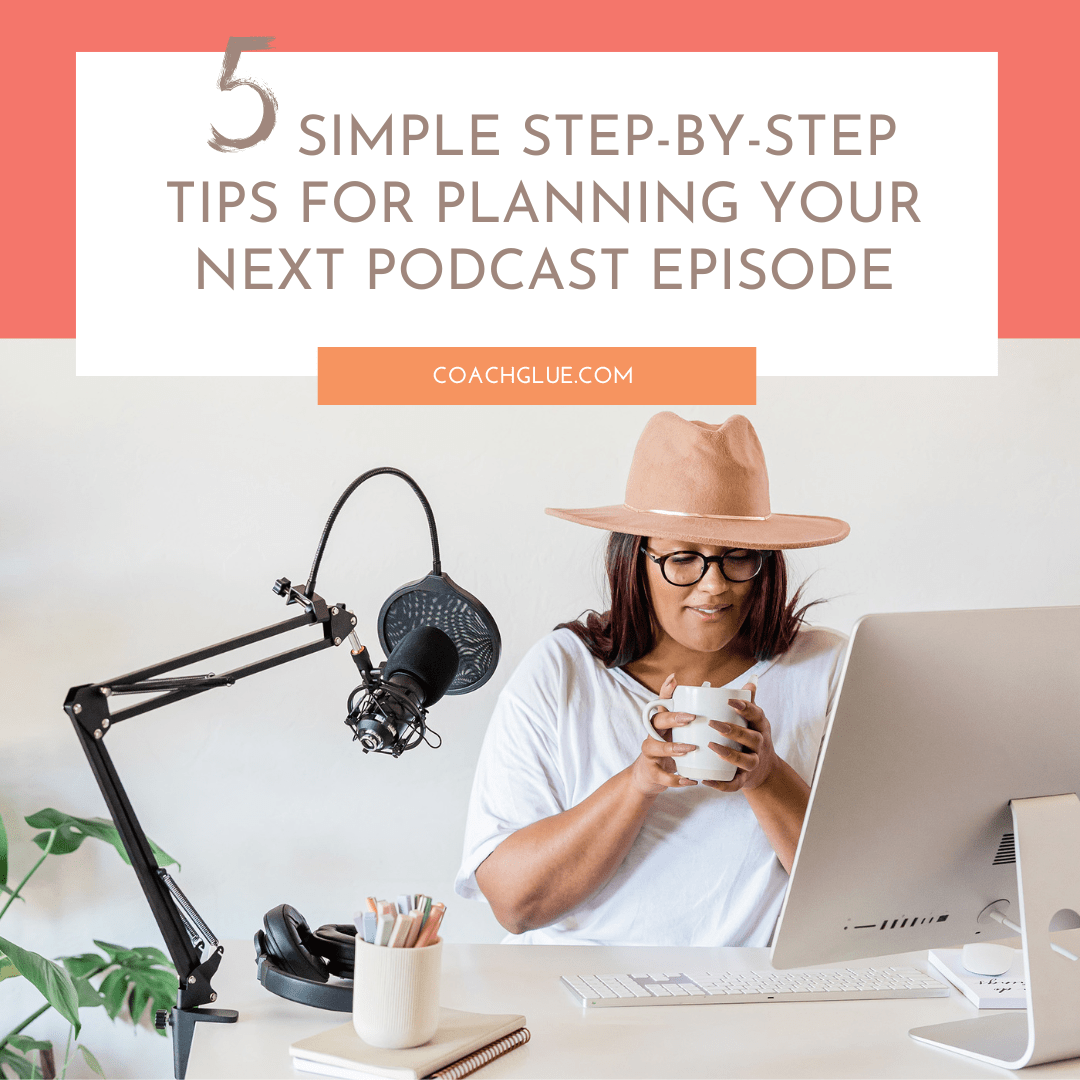Podcasting is a fantastic way to share your message with a potentially massive audience–and it can also be deliciously uncomfortable.
But while we can’t magically erase your fear of sharing your truth and voice on the mic, we can help you with something else: Creating a simple, repeatable process for planning your podcast episodes!
It’s true: Podcasting has taken the Internet by storm. It seems like every coach has a podcast–or at the very least, wants one!
And no matter whether you’re a podcast pro or simply ready to rock the mic for the first time, it’s important to plan your podcast episodes. (The last thing we want is for you to hit ‘record’ and have your mind go completely blank!)
Check out the tips below to create a more sustainable workflow for planning your podcasts so you can stick to a schedule and never miss an episode (or experience dreaded “podfade”):
1) Choose Engaging Episode Topics
Assuming you already have a podcast with an overarching theme or topic, the next step is to plan out individual episodes that fit within the theme.
Here are a few ways to do just that:
- Do keyword research. What are people searching for around your topic? (Fun places to check include Facebook groups, Pinterest and even LinkedIn. Then, try answering these questions via your podcast!)
- Ask people what they want from you. If you have an existing audience, you can ask them (via social media or email, for example–or even at the end of your next podcast episode!) to let you know what they’re itching to learn from you.
- Listen to other podcasts for inspiration. Can you put a unique spin on a topic another podcaster in an adjacent niche jammed on?
And of course, you can also simply list topics you know you could chat about for hours with ease!
Make a list and make it easy-to-edit so you can consistently add to it so you never run out of ideas.
2) Choose a Format for Each Episode (or Your Show in General)
Some podcasters have the same format for every episode–for example, they’re always rolling solo or they’re always interviewing one guest.
That said, there are others who mix it up. If you’re of the latter cohort, be sure to look at each topic in your list and decide whether the information would be best served up solo, or if you’d prefer to bring in an expert. (And if you have an expert in mind, be sure to write down that information, too–so you or your VA can potentially reach out.)
3) Outline Engaging Episode Talking Points
Just because you know a topic like the back of your well-moisturized hand doesn’t mean you don’t need at least a little help once you hit that “Record” button.
For each podcast episode topic, you’ll want to outline 3-5 talking points that you know you must talk about in your episode. (Of course, you can include more than this in your outline, too, but we recommend this as a minimum!)
This might mean that you need to research your topic first, or you might just need to jot down your ideas. Either way, make sure you provide yourself with a loose outline to follow so you don’t get off track or go on crazy-long tangents–and potentially lose your listeners!
And yes–if you’re recording your episode with a guest, you can (and should!) still create an outline with a few brief talking points. You should also send the questions to your guests beforehand, so they feel prepared and comfortable on podcast recording day.
4) Pick ‘Spon Con’ (Or Not!)
If your podcast has sponsors–or you sponsor your own podcast with another business or venture, or simply want to plug your stuff–this is another impact aspect to get down on paper.
What specific sponsors would make sense for this episode topic? Write them down, or skip this step if it doesn’t apply.
5) Put a Snappy Title on It
Podcasts have titles just like anything else–and you’ll need to come up with a snappy, exciting one before the episode goes live. You can brainstorm ideas with your guest or pull a fantastic one-liner from your solo podcast to use as the title. And don’t forget to include the episode number and/or the guest’s name in the title, too.
Then, when all of the above is said and done, of course, you’ll actually need to insert this information into your content calendar.
A simple calendar, spreadsheet, or a program like Trello or ClickUp can work wonders for you. This way you can track the basics like episode title, number and topic, as well as information on your talking points, and guest (including their bio, website and social media).
And last, you’ll need to record your episodes–then publish and promote them.
What if you could get a script for your podcast, or a never ending supply of podcast ideas?
When you join our VIP Club, you’ll snag loads of done-for-you content from blog posts to entire courses that you can simply take and turn into podcast topics, talking points or even entire episodes–without ‘writing’ a single lick of content or having to research it all yourself! Curious? Check it out here.



